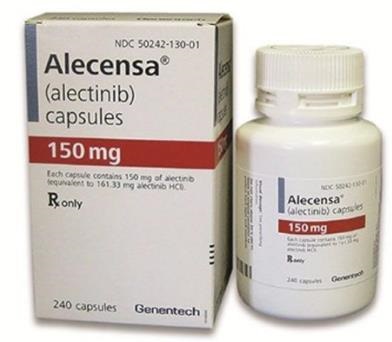Latest data: Roche Alecensa gains no progress in survival for nearly 3 years
May 18, 2018 Source: Sina Pharmaceutical
Window._bd_share_config={ "common":{ "bdSnsKey":{ },"bdText":"","bdMini":"2","bdMiniList":false,"bdPic":"","bdStyle":" 0","bdSize":"16"},"share":{ }};with(document)0[(getElementsByTagName('head')[0]||body).appendChild(createElement('script')) .src='http://bdimg.share.baidu.com/static/api/js/share.js?v=89860593.js?cdnversion='+~(-new Date()/36e5)];On May 17, Roche Pharmaceuticals released follow-up data from the clinical phase 3 trial ALEX study: after two years of follow-up of patients with anaplastic lymphoma kinase (Alk)-positive metastases (late) non-small cell lung cancer, the results showed In the initial treatment, Alecensa (Alectinib) significantly reduced the risk of disease progression or death (PFS of progression-free survival) by 57% compared with crizotinib (hazard ratio [hr]=0.43, 95% CI:0.32- 0.58), the results were evaluated by clinical investigators. Also according to the investigator's assessment, the median PFS for patients receiving Alecensa was 34.8 months [95% CI: 17.7 months-Ne], 10.9 months for patients receiving crizotinib [95% CI: 9.1 -12.9 months] nearly three times. The safety status of Alecensa is consistent with the safety observed in previous studies.

Sandra Horning, Roche's chief medical officer and head of global product development, said: "The follow-up results of Alex's study showed that Alecensa had a significant sustained benefit. The patients with metastatic ALK-positive non-small cell lung cancer survived for nearly three years without disease progression. These results will further support Alecensa as a standard treatment for newly diagnosed patients with this type of lung cancer."
Longer-term analysis also included follow-up data analysis of secondary endpoints of the ALEX study. Compared with crizotinib, Alecensa is superior to crizotinib in the presence of central nervous system (CNS) metastases at baseline. The median PFS of patients with no CNS metastases at baseline was 34.8 months (95% CI: 22.4-Ne), while crizotinib was 14.7 months (95% CI: 10.8-20.3). HR = 0.47, 95% CI: 0.32-0.71). The median PFS of patients with baseline CNS metastasis at Alecensa was 27.7 months (95% CI: 9.2-Ne) compared with 7.4 months for the crizotinib group (95% CI: 6.6-9.6). ) (hr = 0.35, 95% CI: 0.22-0.56). The response time (DOR) for those receiving Alecensa was 33.3 months (95% CI: 31.3-Ne), compared with 11.1 months for those receiving crizotinib (95% CI: 7.5-13.0 months).
These data will be published at the 2018 Annual Meeting of the American Society of Clinical Oncology, held on Sunday, June 3, 2018.
ALK-positive non-small cell lung cancer is more common in young people with a history of mild or non-smoking. It almost always appears in patients with adenocarcinoma of non-small cell lung cancer.
Alecensa (RG 7853) is a highly selective, CNS-active oral drug developed by the Chinese and foreign pharmaceutical Kamakura Research Laboratory for the development of patients with ALK-positive non-small cell lung cancer. Alecensa has been approved by more than 45 countries (including the United States, Europe, and Japan) for initial (first-line) treatment of ALK-positive advanced non-small cell lung cancer. The drug is also approved in the United States, Europe and other regions for the treatment of ALK-positive non-small cell lung cancer after exacerbation of crizotinib treatment or intolerance to crizotinib. (Sina Pharmaceutical Compilation / David)
Article Reference Source: Follow-up phase III data showed Roche's Alecensa helped people with ALK-positive metastatic non-small cell lung cancer live a median of almost three years without their disease worsening or death
surgical gown,non steril isolation gown,sms gown,white gown,blue gown
Shandong Zhushi Pharmaceutical Group Co.,LTD , https://www.sdzs-medical.com